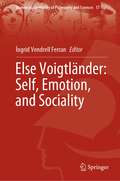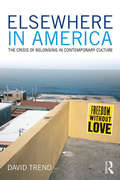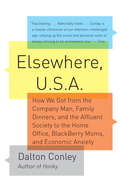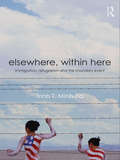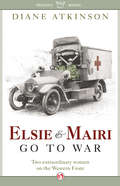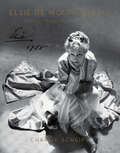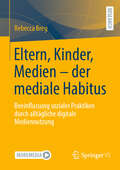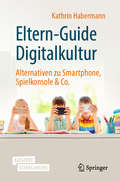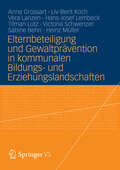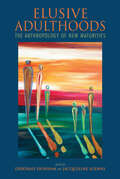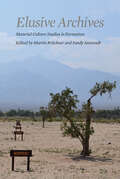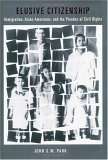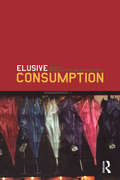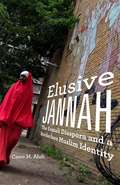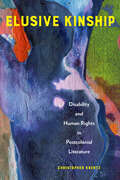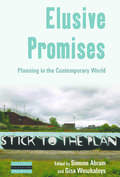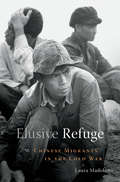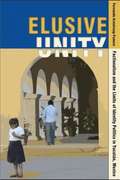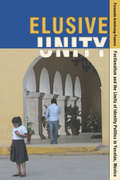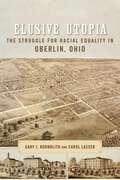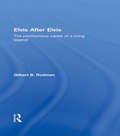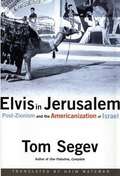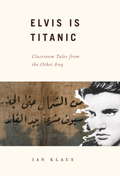- Table View
- List View
Else Voigtländer: Self, Emotion, and Sociality (Women in the History of Philosophy and Sciences #17)
by Íngrid Vendrell FerranThis book is the first to offer a full account of the philosophical work of Else Voigtländer. Locating the sources of her thought in the philosophy and psychology of the nineteenth and twentieth19th and 20th centuries in figures such as Nietzsche and Lipps, the volume book uncovers and examines Voigtländer’s intellectual exchanges with both phenomenology and psychoanalysis. The major themes within her work are considered in 12 expertly written chapters that also cover more recent developments in the philosophy of self, emotion, and sociality. The book appeals to scholars who are interested in the history of philosophy, and in particular of phenomenology, as well as those working on the philosophical roots of psychology and in women's studies.
Elsewhere in America: The Crisis of Belonging in Contemporary Culture (Critical Interventions)
by David TrendAmericans think of their country as a welcoming place where everyone has equal opportunity. Yet historical baggage and anxious times can restrain these possibilities. Newcomers often find that civic belonging comes with strings attached––riddled with limitations or legally punitive rites of passage. For those already here, new challenges to civic belonging emerge on the basis of belief, behavior, or heritage. This book uses the term "elsewhere" in describing conditions that exile so many citizens to "some other place" through prejudice, competition, or discordant belief. Yet, in another way, "elsewhere" evokes an undefined "not yet" ripe with potential. In the face of America’s daunting challenges, can "elsewhere" point to optimism, hope, and common purpose? Through 12 detailed chapters, the book applies critical theory in the humanities and social sciences to examine recurring crises of social inclusion in the U.S. After two centuries of incremental "progress" in securing human dignity, today the U.S. finds itself torn by new conflicts over reproductive rights, immigration, health care, religious extremism, sexual orientation, mental illness, and fear of terrorists. Is there a way of explaining this recurring tendency of Americans to turn against each other? Elsewhere in America engages these questions, charting the ever-changing faces of difference (manifest in contested landscapes of sex and race to such areas as disability and mental health), their spectral and intersectional character (recent discourses on performativity, normativity, and queer theory), and the grounds on which categories are manifest in ideation and movement politics (metapolitics, cosmopolitanism, dismodernism).
Elsewhere, U.S.A.
by Dalton ConleyOver the past three decades, our daily lives have changed slowly but dramatically. Boundaries between leisure and work, public space and private space, and home and office have blurred and become permeable. InElsewhere, U. S. A. , acclaimed sociologist Dalton Conley connects our day-to-day experiences with occasionally overlooked sociological changes, from women's increasing participation in the labor force to rising economic inequality among successful professionals. In doing so, he provides us with an X-ray view of our new social reality.
Elsewhere, Within Here: Immigration, Refugeeism and the Boundary Event
by Trinh T. Minh-haWinner of the 2012 Critics Choice Book Award of the American Educational Studies Association (AESA) World-renowned filmmaker and feminist, postcolonial thinker Trinh T. Minh-ha is one of the most powerful and articulate voices in both independent filmmaking and cultural politics. Elsewhere, Within Here is an engaging look at travel across national borders--as a foreigner, a tourist, an immigrant, a refugee—in a pre- and post-9/11 world. Who is welcome where? What does it mean to feel out of place in the country you call home? When does the stranger appear in these times of dark metamorphoses? These are some of the issues addressed by the author as she examines the cultural meaning and complexities of travel, immigration, home and exile. The boundary, seen both as a material and immaterial event, is where endings pass into beginnings. Building upon themes present in her earlier work on hybridity and displacement in the median passage, and illuminating the ways in which "every voyage can be said to involve a re-siting of boundaries," Trinh T. Minh-ha leads her readers through an investigation of what it means to be an insider and an outsider in this "epoch of global fear." Elsewhere, Within Here is essential reading for those interested in contemporary feminist thought and postcolonial studies.
Elsie and Mairi Go to War
by Diane AtkinsonThe incredible story of two courageous and spirited women who were the only female participants to serve on the Western Front during World War I When they met at a motorcycle club in 1912, Elsie Knocker was a thirty year-old motorcycling divorcee dressed in bottle-green Dunhill leathers, and Mairi Chisholm was a brilliant eighteen-year old mechanic. Little did they know that theirs was to become one of the most extraordinary stories of World War I. In 1914, they roared off into the thick of things in Belgium, driving ambulances to distant military hospitals. Frustrated by the number of men dying of shock in the back of their vehicles, they set up their own first-aid post on the front line in the village of Pervyse, near Ypres, risking their lives working under sniper fire and heavy bombardment for months at a time. As news of their courage and expertise spread, the "Angels of Pervyse" became celebrities, but returning home and adjusting to peacetime life was to prove more challenging than even the war itself.
Elsie de Wolfe's Paris: Frivolity Before the Storm
by Charlie ScheipsPhotographs and stories of the legendary hostess’s extravagant parties and glamorous guests in the final months before the Nazis invaded France.The American decorator Elsie de Wolfe was the international set’s preeminent hostess in Paris during the interwar years. She had a legendary villa in Versailles, where in the late 1930s she held two fabulous parties—her Circus Balls—that marked the end of the social scene that her friend Cole Porter perfectly captured in his songs, as the clouds of war swept through Europe. Charlie Scheips tells the story of these parties using a wealth of previously unpublished photographs and introducing a large cast of aristocrats, beauties, politicians, fashion designers, movie stars, moguls, artists, caterers, florists, party planners, and decorators. A landmark work of social history and a poignant vision of a vanished world, Scheips’s book “culminates with de Wolfe’s final grand fête, the second Circus Ball, which defined the glamour and decadence of international society before the lights went out all over Europe” (Gotham magazine).
Eltern, Kinder, Medien - der mediale Habitus: Beeinflussung sozialer Praktiken durch alltägliche digitale Mediennutzung
by Rebecca BregIn diesem Buch wird das Mediennutzungsverhalten von Heranwachsenden (11–15 Jahre) im Zusammenhang mit sozialer Herkunft und habituellen Mustern empirisch untersucht. Mithilfe von Fragebögen und Interviews wird die digitale Mediennutzung von Schüler*innen an Mittelschulen und Gymnasien verglichen. Die Ergebnisse zeigen, dass mediale Praktiken durch familiäre Strukturen, das soziale Umfeld und kulturelles Kapital beeinflusst werden. Die Untersuchung hebt Unterschiede im digitalen Nutzungsverhalten hervor, die sich in Zugangsmöglichkeiten, elterlicher Begleitung und der Mediennutzung im Alltag zeigen. Während Schüler*innen aus privilegierten Verhältnissen digitale Medien gezielt für Schule und Freizeit nutzen, steht bei sozioökonomisch schwächeren Heranwachsenden oft die Unterhaltung im Vordergrund. Das Konzept des Habitus zeigt, wie soziale Praktiken die Mediennutzung prägen. Digitale Medien sind eng mit sozioökonomischen Strukturen verknüpft. Das Buch liefert wertvolle Erkenntnisse für Eltern, Pädagog*innen und politische Entscheidungsträger*innen, um digitale Kompetenz und Chancengleichheit nachhaltig zu fördern.
Eltern-Guide Digitalkultur: Alternativen zu Smartphone, Spielkonsole & Co.
by Kathrin HabermannDieser Ratgeber hilft Eltern, mit der allgegenwärtigen Präsenz von Smartphone, Tablet und Co. gelassen und kreativ umzugehen. Erfahren Sie, weshalb Smartphones gerade Ihre Kinder magisch anziehen, wie wichtig Langeweile für die Entwicklung Ihres Kindes ist und welche Auswirkungen der Medienkonsum auf die Gehirnentwicklung hat. Dieses Buch zeigt Ihnen zahlreiche spannende und gleichzeitig entwicklungsfördernde Alternativen zum Medienkonsum, die Sie täglich anbieten können. Praxistipps für herausfordernde Situationen wie der Restaurantbesuch, lange Autofahrten oder die fünfstündige Bahnfahrt: Mit dieser Lektüre sind Sie optimal gerüstet.Plus:• Wissenschaftliche Hintergründe und aktuelle Studien übersichtlich und verständlich aufbereitet• Fragebögen und Checklisten zur Ermittlung des Medienkonsums• Material- und Spiellisten, Mediennutzungsvertrag u.v.m. zum Download und als Kopiervorlage
Elternbeteiligung und Gewaltprävention in kommunalen Bildungs- und Erziehungslandschaften
by Anne Grossart Heinz Müller Liv-Berit Koch Victoria Schwenzer Hans-Josef Lembeck Sabine Behn Tilman Lutz Vera LanzenDie gesellschaftspolitische Bedeutung gelingender Bildungs-, Betreuungs- und Erziehungsprozesse verweist auf eine der zentralen Herausforderungen für Kommunen: Die Weiterentwicklung ihrer Bildungs- und Erziehungslandschaften. Wie wird das Zusammenspiel von Jugendhilfe, Schule, jungen Menschen und insbesondere Eltern gefördert? Wie wird das Thema Gewaltprävention systemübergreifend zum integralen Bestandteil der Weiterentwicklung und wie gelingt die Kooperation von allen professionellen und nicht professionellen Akteuren, insbesondere der Eltern? Die AutorInnen fokussieren Elternbeteiligung und Gewaltprävention im Rahmen eines Praxisforschungsprojekts als Schlüssel- und Querschnittsthemen für die Gestaltung von Bildungs- und Erziehungslandschaften. Sie stellen "Gute Praxis" vor, insbesondere Modelle und Instrumente, die in Bildungs- und Erziehungslandschaften eingesetzt werden können.
Elusive Adulthoods: The Anthropology of New Maturities
by Deborah Durham and Jacqueline SolwayEssays on the changing meanings of adulthood in places around the world: “An important collection that furthers anthropological work on life stages.” —Susan Reynolds Whyte, author of Generations in Africa: Connections and ConflictsElusive Adulthoods examines why, in recent years, complaints about an inability to achieve adulthood have been heard in societies around the world.By exploring the changing meaning of adulthood in Botswana, China, Sudan, Papua New Guinea, Russia, Sri Lanka, Uganda, and the United States, contributors to this volume pose the problem of “What is adulthood?” and examine how the field of anthropology has come to overlook this meaningful stage in its studies.Through these case studies we discover different means of recognizing the achievement of adulthood, such as through negotiated relationships with others, including grown children, and as a form of upward class mobility. We also encounter the difficulties that come from a sense of having missed full adulthood, instead jumping directly into old age in the course of rapid social change, or a reluctance to embrace the stability of adulthood and necessary subordination to job and family. In all cases, the contributors demonstrate how changing political and economic factors form the background for generational experience and understanding of adulthood, which is a major focus of concern for people around the globe as they negotiate changing ways of living.
Elusive Archives: Material Culture in Formation (Material Culture Perspectives)
by Oliver Scheiding Wendy Bellion Bernard L. Herman Julian Yates Sarah Wasserman Alexander Lawrence Ames Torsten Cress Julie L. McGee Cindy Ott Laura E. Helton Jennifer Van Horn Kiersten Thamm Alexandra Ward Halina Adams Rosalie Hooper Spencer Wigmore Catherine Morrissey Michelle Everidge Kaila T. Schedeen Lu Ann Cunzo Natalie Elizabeth Wright J. Ritchie Garrison Jesse Kraft Michael J. Emmons Jessica ConradThe essays that comprise Elusive Archives raise a common question: how do we study material culture when the objects of study are transient, evanescent, dispersed or subjective? Such things resist the taxonomic protocols that institutions, such as museums and archives, rely on to channel their acquisitions into meaningful collections. What holds these disparate things together here are the questions authors ask of them. Each essay creates by means of its method a provisional collection of things, an elusive archive. Scattered matter then becomes fixed within each author’s analytical framework rather than within the walls of an archive’s reading room or in cases along a museum corridor. This book follows the ways in which objects may be identified, gathered, arranged, conceptualized and even displayed rather than by “discovering” artifacts in an archive and then asking how they came to be there. The authors approach material culture outside the traditional bounds of learning about the past. Their essays are varied not only in subject matter but also in narrative format and conceptual reach, making the volume accessible and easy to navigate for a quick reference or, if read straight through, build toward a new way to think about material culture.
Elusive Citizenship: Immigration, Asian Americans, and the Paradox of Civil Rights (Critical America #72)
by John S. ParkSince the late nineteenth century, federal and state rules governing immigration and naturalization have placed persons of Asian ancestry outside the boundaries of formal membership. A review of leading cases in American constitutional law regarding Asians would suggest that initially, Asian immigrants tended to evade exclusionary laws through deliberate misrepresentations of their identities or through extralegal means. Eventually, many of these immigrants and their descendants came to accept prevailing legal norms governing their citizenship in the United States. In many cases, this involved embracing notions of white supremacy. John S. W. Park argues that American rules governing citizenship and belonging remain fundamentally unjust, even though they suggest the triumph of a "civil rights" vision, where all citizens share the same basic rights. By continuing to privilege members over non-members in ways that are politically popular, these rules mask injustices that violate principles of fairness. Importantly, Elusive Citizenship also suggests that politically and socially, full membership in American society remains closely linked with participation in exclusionary practices that isolate racial minorities in America.
Elusive Consumption
by Helene Brembeck Karin M. EkströmIn the context of rising consumerism and globalization, books on consumption are numerous. These tend to be firmly rooted in particular disciplines, however sociology, anthropology, business or cultural studies and as a result often present a blinkered view. Charged with the mission of unravelling what consumption means and how it operates, the worlds leading experts were flown to a secluded location in Sweden to 'battle it out'. This pioneering book represents the outcome. Ranging from the 'little black dress' to on-line communities, Elusive Consumption challenges our very understanding of consumerism. How successful is the advertising world in manipulating our buying patterns? Does the global marketplace promote cultural homogeneity or heterogeneity? Is the West really more of a 'consumerist civilization' than other countries? Does the advertising of certain products influence a voters choice of political party? How are products associated and marketed to different genders? These controversial topics and many more are discussed. Covering virtually every aspect of the word 'consumerism', Elusive Consumption provides a state-of-the-art view of the highly commercialized society we inhabit today. Some might have it that consumers are unwitting pawns, completely lacking in agency. Others might argue that consumer choices are empowering and subtly shape production. Richard Wilk, Colin Campbell, John F. Sherry, Richard Elliott, Russell Belk, and Daniel Miller who offers the most persuasive argument in this battle royal?
Elusive Jannah: The Somali Diaspora and a Borderless Muslim Identity
by Cawo M. AbdiAs a Somali working since high school in the United Arab Emirates, Osman considers himself &“blessed&” to be in a Muslim country, though citizenship, with the security it offers, remains elusive. For Ardo, smuggled out of Somalia to join her husband in South Africa, insecurities are of a more immediate, physical kind, and her economic prospects and legal status are more uncertain. Adam, in the United States—a destination often imagined as an earthly Eden, or jannah, by so many of his compatriots—now sees heaven in a return to Somalia.The stories of these three people are among the many that emerge from mass migration triggered by the political turmoil and civil war plaguing Somalia since 1988. And they are among the diverse collection presented in eloquent detail in Elusive Jannah, a remarkable portrait of the very different experiences of Somali migrants in the UAE, South Africa, and the United States. Somalis in the UAE, a relatively closed Muslim nation, are a minority within a large South Asian population of labor migrants. In South Africa, they are part of a highly racialized and segregated postapartheid society. In the United States they find themselves in a welfare state with its own racial, socioeconomic, and political tensions. A comparison of Somali settlements in these three locations clearly reveals the importance of immigration policies in the migrant experience.Cawo M. Abdi&’s nuanced analysis demonstrates that a full understanding of successful migration and integration must go beyond legal, economic, and physical security to encompass a sense of religious, cultural, and social belonging. Her timely book underscores the sociopolitical forces shaping the Somali diaspora, as well as the roles of the nation-state, the war on terror, and globalization in both constraining and enabling their search for citizenship and security.
Elusive Kinship: Disability and Human Rights in Postcolonial Literature
by Christopher KrentzCharacters with disabilities are often overlooked in fiction, but many occupy central places in literature by celebrated authors like Chinua Achebe, Salman Rushdie, J. M. Coetzee, Anita Desai, Jhumpa Lahiri, Edwidge Danticat, and others. These authors deploy disability to do important cultural work, writes Christopher Krentz in his innovative study, Elusive Kinship. Such representations not only relate to the millions of disabled people in the global South, but also make more vivid such issues as the effects of colonialism, global capitalism, racism and sexism, war, and environmental disaster. Krentz is the first to put the fields of postcolonial studies, studies of human rights and literature, and literary disability in conversation with each other in a book-length study. He enhances our appreciation of key texts of Anglophone postcolonial literature of the global South, including Things Fall Apart and Midnight’s Children. In addition, he uncovers the myriad ways fiction gains energy, vitality, and metaphoric force from characters with extraordinary bodies or minds. Depicting injustices faced by characters with disabilities is vital to raising awareness and achieving human rights. Elusive Kinship nudges us toward a fuller understanding of disability worldwide.
Elusive Promises
by Simone Abram Gisa WeszkalnysPlanning in contemporary democratic states is often understood as a range of activities, from housing to urban design, regional development to economic planning. This volume sees planning differently-as the negotiation of possibilities that time offers space. It explores what kind of promise planning offers, how such a promise is made, and what happens to it through time. The authors, all leading anthropologists, examine the time and space, creativity and agency, authority and responsibility, and conflicting desires that plans attempt to control. They show how the many people involved with planning deal with the discrepancies between what is promised and what is done. The comparative essays offer insight into the expected and unexpected outcomes of planning (from visionary utopias to bureaucratic dystopia or something in-between), how the future is envisioned at the outset, and what actual work is done and how it affects people's lives.
Elusive Refuge
by Laura MadokoroLaura Madokoro recovers the lost history of millions of displaced Chinese who fled the Communist Revolution and recounts humanitarian efforts to find homes for them outside China. Entrenched bigotry in predominantly white countries, the spread of human rights, Cold War geopolitics, and the Vietnam War shaped refugee policies that still hold sway.
Elusive Refuge: Chinese Migrants in the Cold War
by Laura MadokoroThe 1949 Chinese Communist Revolution is a subject of inexhaustible historical interest, but the plight of millions of Chinese who fled China during this tumultuous period has been largely forgotten. Elusive Refuge recovers the history of China’s twentieth-century refugees. Focusing on humanitarian efforts to find new homes for Chinese displaced by civil strife, Laura Madokoro points out a constellation of factors—entrenched bigotry in countries originally settled by white Europeans, the spread of human rights ideals, and the geopolitical pressures of the Cold War—which coalesced to shape domestic and international refugee policies that still hold sway today.Although the United States, Canada, Australia, New Zealand, and South Africa were home to sizeable Asian communities, Chinese migrants were a perpetual target of legislation designed to exclude them. In the wake of the 1949 Revolution, government officials and the broader public of these countries questioned whether Chinese refugees were true victims of persecution or opportunistic economic migrants undeserving of entry. It fell to NGOs such as the Lutheran World Federation and the World Council of Churches to publicize the quandary of the vast community of Chinese who had become stranded in Hong Kong.These humanitarian organizations achieved some key victories in convincing Western governments to admit Chinese refugees. Anticommunist sentiment also played a role in easing restrictions. But only the plight of Southeast Asians fleeing the Vietnam War finally convinced the United States and other countries to adopt a policy of granting permanent residence to significant numbers of refugees from Asia.
Elusive Unity
by Fernando Armstrong-FumeroIn Elusive Unity, Armstrong-Fumero examines early twentieth-century peasant politics and twenty-first-century indigenous politics in the rural Oriente region of Yucatán.The rural inhabitants of this region have had some of their most important dealings with their nation's government as self-identified "peasants" and "Maya." Using ethnography, oral history, and archival research, Armstrong-Fumero shows how the same body of narrative tropes has defined the local experience of twentieth-century agrarianism and twenty-first-century multiculturalism. Through these recycled narratives, contemporary multicultural politics have also inherited some ambiguities that were built into its agrarian predecessor. Specifically, local experiences of peasant and indigenous politics are shaped by tensions between the vernacular language of identity and the intense factionalism that often defines the social organization of rural communities. This significant contribution will be of interest to historians, anthropologists, and political scientists studying Latin America and the Maya.
Elusive Unity: Factionalism and the Limits of Identity Politics in Yucatán, Mexico
by Fernando Armstrong-FumeroIn Elusive Unity, Armstrong-Fumero examines early twentieth-century peasant politics and twenty-first-century indigenous politics in the rural Oriente region of Yucatán. The rural inhabitants of this region have had some of their most important dealings with their nation’s government as self-identified “peasants” and “Maya.” Using ethnography, oral history, and archival research, Armstrong-Fumero shows how the same body of narrative tropes has defined the local experience of twentieth-century agrarianism and twenty-first-century multiculturalism. Through these recycled narratives, contemporary multicultural politics have also inherited some ambiguities that were built into its agrarian predecessor. Specifically, local experiences of peasant and indigenous politics are shaped by tensions between the vernacular language of identity and the intense factionalism that often defines the social organization of rural communities. This significant contribution will be of interest to historians, anthropologists, and political scientists studying Latin America and the Maya.
Elusive Utopia: The Struggle for Racial Equality in Oberlin, Ohio (Antislavery, Abolition, and the Atlantic World)
by Edward Bartlett Rugemer Gary Kornblith Richard J. Blackett Carol LasserBefore the Civil War, Oberlin, Ohio, stood in the vanguard of the abolition and black freedom movements. The community, including co-founded Oberlin College, strove to end slavery and establish full equality for all. Yet, in the half-century after the Union victory, Oberlin’s resolute stand for racial justice eroded as race-based discrimination pressed down on its African American citizens. In Elusive Utopia, noted historians Gary J. Kornblith and Carol Lasser tell the story of how, in the nineteenth and early twentieth centuries, Oberlin residents, black and white, understood and acted upon their changing perceptions of race, ultimately resulting in the imposition of a color line.Founded as a utopian experiment in 1833, Oberlin embraced radical racial egalitarianism in its formative years. By the eve of the Civil War, when 20 percent of its local population was black, the community modeled progressive racial relations that, while imperfect, shone as strikingly more advanced than in either the American South or North. Emancipation and the passage of the Civil War amendments seemed to confirm Oberlin's egalitarian values. Yet, contrary to the expectations of its idealistic founders, Oberlin’s residents of color fell increasingly behind their white peers economically in the years after the war. Moreover, leaders of the white-dominated temperance movement conflated class, color, and respectability, resulting in stigmatization of black residents. Over time, many white Oberlinians came to view black poverty as the result of personal failings, practiced residential segregation, endorsed racially differentiated education in public schools, and excluded people of color from local government. By 1920, Oberlin’s racial utopian vision had dissipated, leaving the community to join the racist mainstream of American society.Drawing from newspapers, pamphlets, organizational records, memoirs, census materials and tax lists, Elusive Utopia traces the rise and fall of Oberlin's idealistic vision and commitment to racial equality in a pivotal era in American history.
Elvis After Elvis: The Posthumous Career of a Living Legend
by Gilbert B. Rodman'For a dead man, Elvis Presley is awfully noisy. His body may have failed him in 1977, but today his spirit, his image, and his myths do more than live on: they flourish, they thrive, they multiply.'Why is Elvis Presley so ubiquitous a presence in US culture? Why does he continue to enjoy a cultural prominence that would be the envy of the most heavily publicized living celebrities?In Elvis after Elvis Gil Rodman traces the myriad manifestations of The King in popular and not-so-popular culture. He asks why Elvis continues to defy our expectations of how dead stars are supposed to behave: Elvis not only refuses to go away, he keeps showing up in places where he seemingly doesn't belong.Rodman draws upon an extensive and eclectic body of Elvis 'sightings', from Elvis's appearances at the heart of the 1992 Presidential campaign to the debate over his worthiness as a subject for a postage stamp, and from Elvis's central role in furious debates about racism and the appropriation of African-American music to the world of Elvis impersonators and the importance of Graceland as a place of pilgrimage for Elvis fans and followers.Rodman shows how Elvis has become inseparable from many of the defining myths of US culture, enmeshed with the American dream and the very idea of the 'United States', caught up in debates about race, gender and sexuality and in the wars over what constitutes a national culture.
Elvis In Jerusalem: Post-Modernism and the Americanization of Israel
by Haim Watzman Tom SegevAs the Middle East conflict enters its most violent phase, Tom Segev offers a lively, contentious polemic against cherished and rigid notions of Israel's national unity and culture. In his many works of history, Tom Segev has challenged the entrenched understanding of crucial moments in Israel's past. Now, in a short, sharp, polemical book, Segev has turned his sights from Israeli history to confront some revered assumptions about the country today.Drawing on personal experience as well as all kinds of artifacts from Israeli popular culture -- shopping malls, fast food, public art, television, religious kitsch -- Segev offers a controversial point of view: the sweeping Americanization of the country, rued by most, has had an extraordinarily beneficial influence, bringing not only McDonald's and Dunkin' Donuts but the virtues of pragmatism, tolerance, and individualism.
Elvis Is Everywhere
by Rowland SchermanElvis, it seems, is everywhere. And for about three years, Rowland Scherman went looking for him. Elvis Is Everywhere captures this pursuit, in 70 photos documenting the author's travels to Boston, Los Angeles, Nashville, Venice Beach, Orlando, Nag’s Head, Cape Cod, New York, Pasadena, and, of course, Memphis. In all these places was evidence that Elvis lives, at least in spirit, long after his well-mourned death. This book is not so much about Elvis as it is about us. The abiding loyalty and reverence of the King’s devoted fans have enabled him to transcend even the most outrageous promotional hype. His image and his name have been absorbed into the language, the landscape, our very culture. Elvis continues to cast his spell on our collective consciousness.
Elvis Is Titanic
by Ian KlausIn the spring of 2005, Ian Klaus, a twenty-six-year-old Rhodes Scholar, traveled eight hours from Turkey, via broken-down taxi and armed convoy, to reach Salahaddin University in Arbil, the largest city in Iraqi Kurdistan. Elvis Is Titanic is the poignant, funny, and eye-opening story of the semester he spent there teaching U. S. history and English in the thick of the war for hearts and minds.
